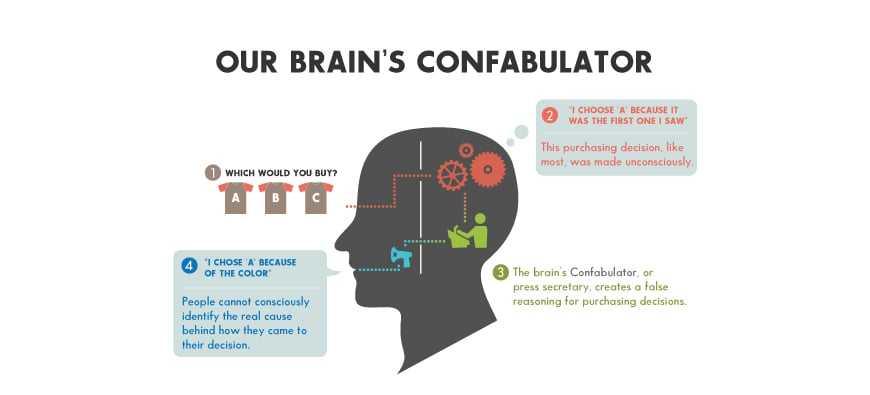The Confabulator: What it is and Why CMOs Should Care
The Confabulator: What it is and Why CMOs Should Care
According to CASRO, $8.6 billion are spent each year in the United States on consumer marketing research using online or phone-based surveys that rely on explicit reports (what people say they want). One of many challenges marketers face in this area is understanding what people are truly interested in, parsing through the noise of what people say they want and getting at the signal of what people actually want. Years of psychological research provide insight into why these explicit reports tap into only a small percentage of what goes into a consumer's decision-making process.
Why CMO’s need a different method
The human mind is composed of many different psychological modules, much like a computer loaded up with many different software programs. These modules perform different tasks (e.g., vision, language, decision-making), and have access to different kinds of information. Michael Gazzaniga, a research psychologist, pioneered work on split-brain patients in order to understand a module of the brain referred to as "the confabulator” (or your brain’s press secretary).
The confabulator is the module of the brain that gives us a "likely story" for why we do the things we do despite a lack of understanding on a conscious level. This is why explicit verbal reports are unreliable (go here for a basic introduction, and for an interesting discussion of the implications, see this).
Beginning with the cognitive revolution in the late 1950s, the field of psychology began mapping the mind in earnest, and many techniques have been developed to understand what goes on in our unconscious modules. These research techniques can be used to access the unconscious parts of the mind, including those responsible for consumer decision-making, allowing researchers to get around the explicit reports of the press secretary, and directly access the source of consumer decisions and motivations.
It's more than explicit vs implicit
Consumer preferences vary greatly between people and can be hard to measure, even with tools that can analyze implicit behavior. But the research field that studies individual differences, personality psychology, offers powerful tools that are currently underutilized. As TipTap Lab's advisor Geoffrey Miller implies in his book Spent, understanding people’s personality traits and being able to target people based on traits has the potential to revolutionize marketing.
TipTap Lab provides tools to break through implicit barriers and assess consumer personality traits and preferences, allowing marketers to create a summary of the most powerful kinds of individual motivations that drive consumer behavior. Using personality, traits and scales, this new type of research provides a fundamental difference of approach, bringing a new level of success to a brand’s marketing efforts.


